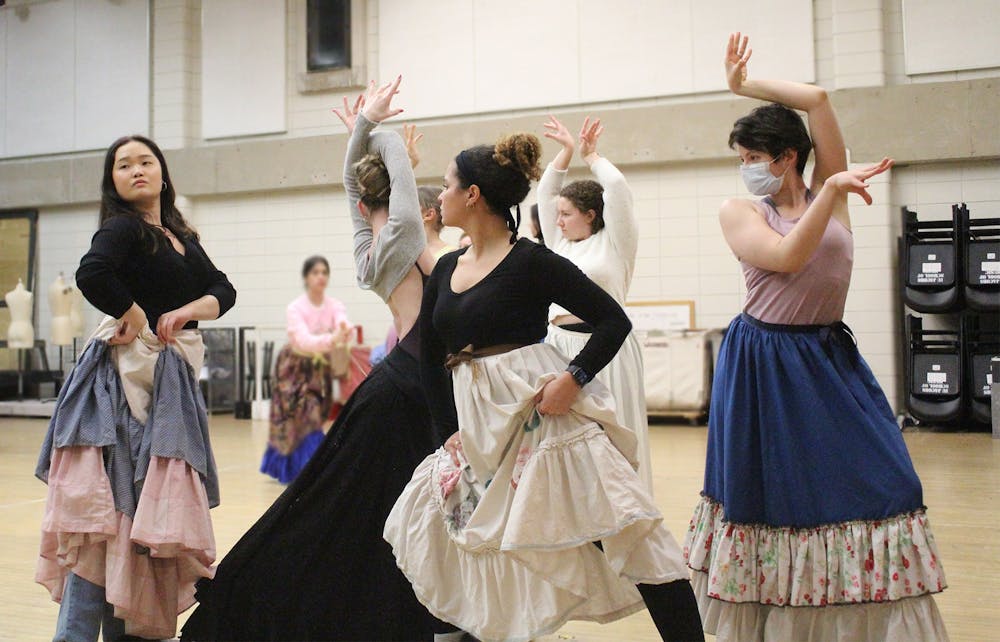The uneasy hum of the opening electric score fills the Musical Arts Center — immediately setting the tone for the beautifully-human tragedy about to unfold before the audience: Federico Garcia Lorca’s life and murder.
The gorgeously raw and moving production is directed with sharp attention by Jeffrey Buchman and the choreography — fluid and hypnotizing — is by Rosa Mercedes.
Jacobs School of Music will present “Ainadamar” with two different casts at 7:30 p.m. Feb. 3-4 and 10-11 at the Musical Arts Center.
“Ainadamar” depicts the story of renowned Spanish poet and playwright, Lorca, told by his close friend and muse Margarita Xirgu. IU doctoral candidate, Erin Koolman, who plays Lorca in one cast was familiar with the artist’s work and was dedicated to the show from the beginning.
“I’ve never been so emotionally connected from the get-go,” Koolman said. “Knowing Lorca’s life and knowing what led ultimately to his murder — it really is an honor — it really is a story that deserves to be told.”
Related: [COLUMN: ‘The Last of Us’ episode 3: bad days and good days]
This story of Lorca shows his decision to remain in Spain during the Spanish Civil War to speak for those who are speechless. This idea of an artist fighting for others through their work is something Koolman believed could still be seen today.
“Wherever there is a major event, art has either predicted it or followed it with some sort of reflection,” Koolman said. “When you think about the various threats to democracy around the world, it’s not a hard leap to connect the things that Lorca would have seen and felt to what we experience today.”
Because of Lorca’s lifestyle and opposition to the Falange — a fascist political party — he was arrested and promptly executed by Falangist guard, Jose Tripaldi. IU junior, Theo Harrah, plays the role of Tripaldi in one cast and was drawn to the inner turmoil of the character having to execute political prisoners on exaggerated charges.
“He’s a representation of the nationalist movement as a whole,” Harrah said. “He’s a Catholic, which is a direct dichotomy to what he is doing as an executioner. It’s the dichotomy of him doing his duty but also him having this empathy as a good Catholic.”
The scene with Tripaldi and the prisoners is carried through Osvaldo Golijov’s hauntingly emotional score, written in Spanish and composed using flamenco rhythms. This unique musical inspiration creates a uniquely Spanish score that Harrah felt was essential to sharing the story of Lorca.
Related: [COLUMN: How to create the perfect Valentine’s Day gift basket]
“It’s imperative that if we’re going to actually share the real story of this person and the real story of this time, we have to use music that reflects the culture we get the story from,” Harrah said.
IU masters student, Kathiana Dargenson, plays actress Margarita Xirgu in one cast, telling the audience her story based off her real-life friendship with the artist, painting a portrait of reality not often seen in opera but Dargenson believed it was an essential component to better understanding the piece.
“It humanizes the entire work,” Dargenson said. “These were real experiences, real emotions, and as a performer to know that this was not just made up but is based off true accounts- it makes it more tangible, more real.”
The reality of the opera is its greatest strength as every scene and action becomes so much more impactful when one remembers the horrific realities that Spanish civilians went through during the civil war. All these elements come together to create a new contemporary work that Dargenson sees as a gateway to a more diverse arts world.
“Having these new works makes the room look different,” Dargenson said. “Works like this, works like ‘Anne Frank,’ or ‘Highway 1, USA’ — those bring in different crowds and increase accessibility of the arts.”






